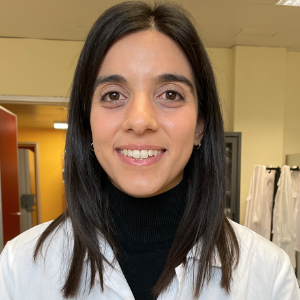Title : Metabolomic characterization of autochthonous legume ecotypes
Abstract:
Autochthonous ecotypes or local varieties are plant genetic resources characterized by high genetic variability, specific adaptation to environmental stress conditions, and the presence of specialized metabolites (terpenoids, flavonoids, alkaloids) with human health-promoting effects. However, local varieties are gravely threatened by extinction mainly for their replacement by commercial varieties. One of the strategies to preserve these genetic resources and to draw the interest of local farmers and consumers involved in their conservation is to identify their unique characteristics. Untargeted metabolomics is a powerful approach that enables analysis of a wide range of metabolite classes and provides useful information for the discrimination of different local varieties, identifying their metabolic signatures and supporting their valorization and conservation. The present study aimed to provide a global view of the metabolite diversity of 3 autochthonous lentil ecotypes from different villages of Molise region (Italy) – Capracotta, CA; Rionero Sannitico, RS; and Agnone, A – in comparison to 1 ecotype from Umbria region (Italy) – Castelluccio di Norcia, CS – and 3 autochthonous bean ecotypes from Molise region (Italy) – Ciliegino bean, CI -, Basilicata region (Italy) – San Michele Rosso bean, SMR -, and Spain – Spanish Ciliegino bean, CI SP -. A quadrupole time of flight mass spectrometer-based liquid chromatography (LC-MS/MS) metabolomics technique allowed the detection of 407 and 544 differential accumulated metabolites (DAMs) for bean (Be) and lentil (Le) ecotypes, respectively. The annotation of the DAMs, by consulting home-made spectral and MS libraries (e.g., the GNPS Public Spectral Library) and a molecular network approach (MetGem and Cytoscape software), allowed 53% and 54% of them to be assigned to different metabolic categories (10 for Be and 13 for Le). Flavonoids were the most represented metabolic category (66 for Be, 87 for Le), followed by amino acids and derivatives (59 for Be, 61 for Le), and cinnamic acids (22 for Be, 50 for Le). However, the ten most important metabolic features for the discrimination of populations identified by the variable importance in the projection (VIP) plot of PLS-DA belong to flavonoids, amino acids, and terpenoids for lentils and flavonoids for beans. Significant variations in the metabolite composition of Be and Le were also observed through the combination of univariate and multivariate statistical analyses. According to the PCA scores plot, A, CA, and RS lentil ecotypes were separated from CS by the PC1 (56 % of variance). Similarly, CI and CI SP were separated from SMR by the PC1 (58 % of variance). These results have been confirmed by the heatmap, allowing the selection of ecotypes-specific metabolic features. The enrichment analysis is in progress to assess the presence of enriched metabolomic categories for each ecotype, and thus improve the annotation process. To shed more light on the beneficial/health-promoting effect of some bioactive compounds, the antibacterial, antiproliferative, and antioxidative activity of both legume extracts were also evaluated and discussed according to the differential metabolic profiles characterizing each ecotype.
Audience Takeaway:
- The audience will be introduced to the untargeted metabolomics approach for the characterization and discrimination of autochthonous ecotypes, exploring a wide range of metabolite classes. This knowledge applies to researchers and scientists involved in the valorization and conservation of local varieties and, in general, in agro-biodiversity.
- This research provides a basis for other faculty members to extend their studies on the untargeted metabolic analysis of plant species. A similar approach can be applied to similar studies on the characterization and valorization of plant genetic resources, or to studies involved in plant- environment interaction, enabling a deep and detailed understanding of the metabolic mechanisms and characteristics involved in the plant response to abiotic and biotic factors in the environment.



